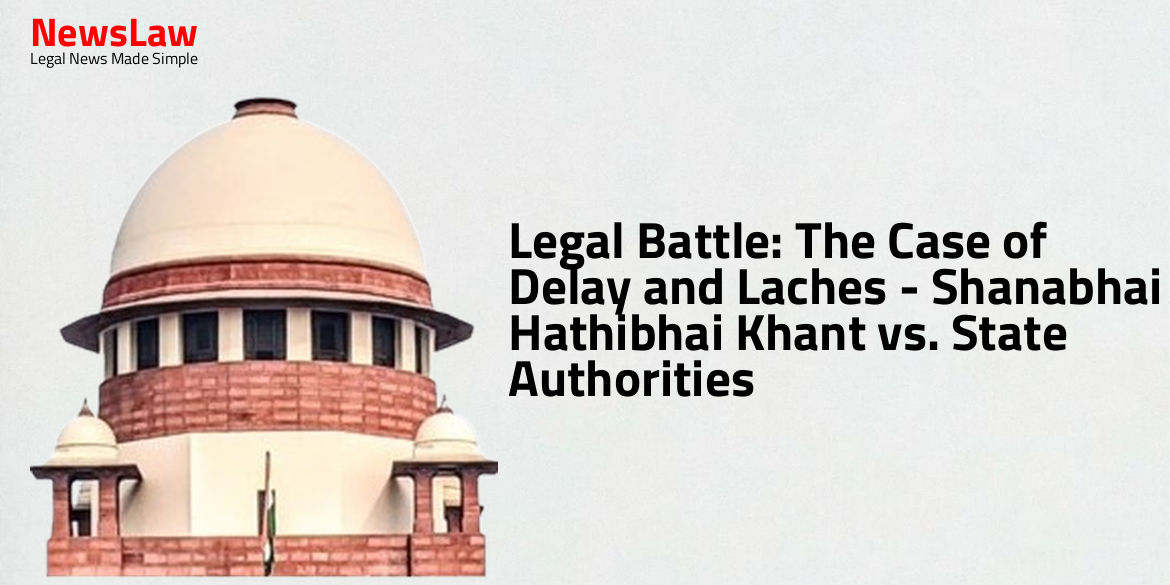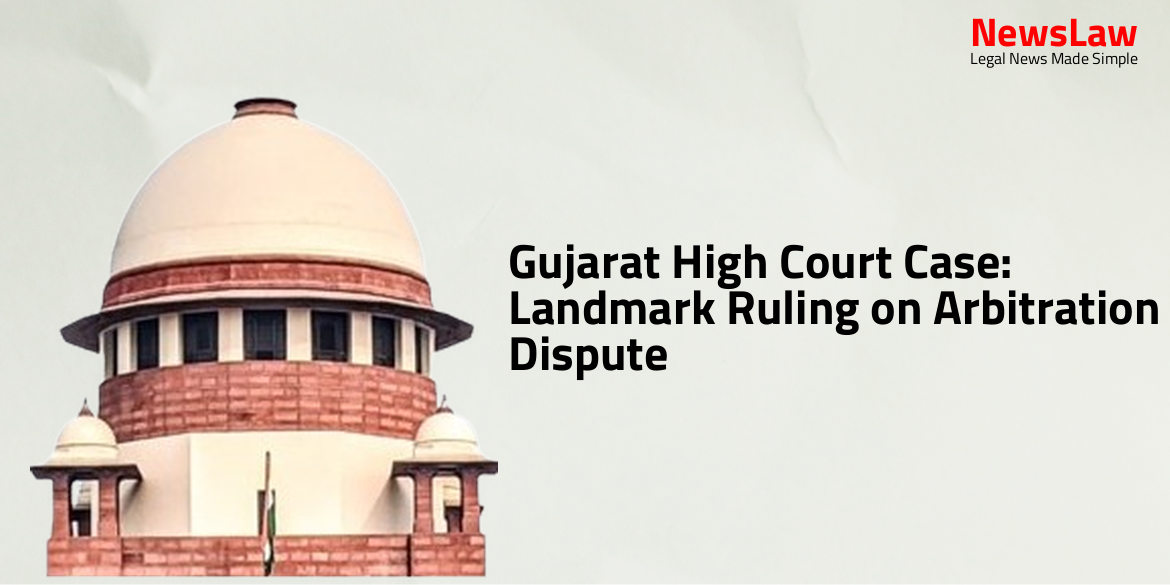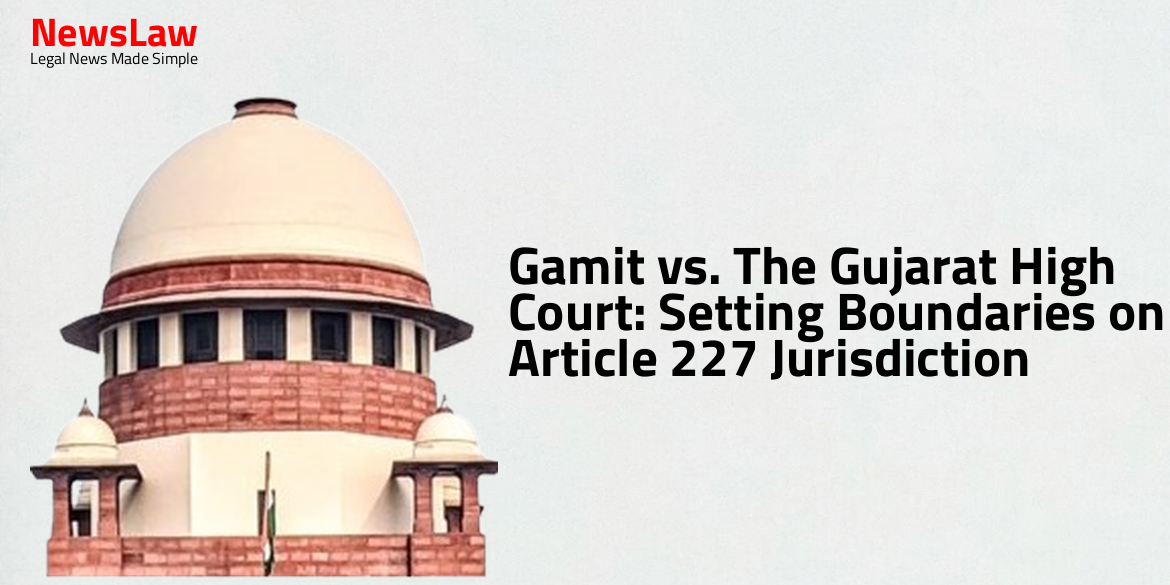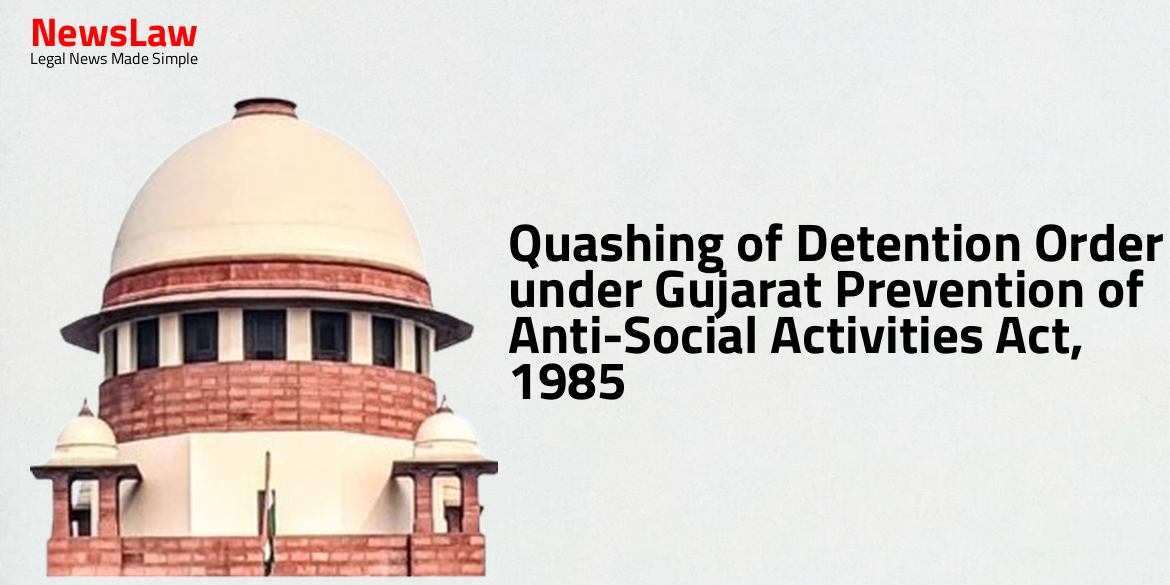Delve into the legal intricacies of a significant case involving delay and laches in the matter between Shanabhai Hathibhai Khant and the State Authorities. The Gujarat High Court’s judgment sheds light on the consequences of postponed actions and its impact on seeking remedies. Learn about the critical considerations of delay in approaching the court and its repercussions on the balance of justice.
Facts
- The State Authorities challenged the order of the learned Single Judge granting the deemed date of promotion to the original petitioner.
- The Single Judge granted the deemed date of promotion on 01.06.1983 to the petitioner in the cadre of Clerk (Class-III) with all consequential benefits including pension.
- The State Authorities raised a preliminary objection regarding delay, which was not considered by the Single Judge.
- After hearing both parties, the Single Judge allowed the writ petition and granted the relief as prayed by the petitioner.
- Shanabhai Hathibhai Khant and the petitioner both faced similar situations regarding promotion and sought relief through writ petitions.
- The petitioner was granted deemed date of promotion from 06.03.1993 through a judgment and order dated 18.11.1991.
- The petitioner passed the pre-service training examination for promotion as Clerk (Class- III) on 21.02.1983 but was not promoted at the relevant time.
- Despite not being granted promotion, the petitioner was given a promotion as Clerk on 15.12.2006 without a deemed date after giving an undertaking not to claim deemed date or seek court relief.
- The petitioner later submitted representations in 2009 and 2010 requesting a deemed date of promotion similar to Shanabhai Hathibhai Khant.
- The petitioner, belonging to the SEBC category, joined duty on 01.06.1979 and was appointed as Kotwal (Class-IV) on 30.05.1979.
- Four years later, in 2014, the petitioner filed a writ petition seeking a deemed date of promotion for which he had waited for a long period without action.
- The petitioner’s case mirrored that of Shanabhai Hathibhai Khant who passed the pre-service training exam after the petitioner but was granted deemed date of promotion.
Arguments
- The petitioner had made representations prior to his superannuation in 2009-10, which were not considered.
- Despite being due for promotion since 1983, the petitioner’s case was not considered, while his similarly situated junior colleague was granted promotion following a court order.
- There was a significant delay in approaching the Hon’ble Court as highlighted by the learned Assistant Government Pleader.
- The delay was heavily relied upon by the appellant in their affidavit.
- The respondent’s counsel argued that there was gross injustice to the petitioner and that the delay should not be the sole determining factor.
- Two grounds were pressed by the respondent before the court: (i) the petitioner became due for promotion in 1983 and (ii) the junior colleague was promoted in 1991.
- The respondent’s counsel strongly advocated for the confirmation of the order passed by the learned Single Judge based on merit.
- Key contentions raised by ARG_RESPONDENT’s advocates need to be considered.
- Certain facts are necessary to address the arguments from both sides.
- Analyzing the contentions raised by ARG_RESPONDENT’s representatives is crucial in reaching a decision.
Analysis
- Delay and laches are significant factors considered in writ court jurisdiction.
- Court may not entertain petitions if there is unreasonable delay in seeking relief.
- Indolent behavior and laxity in asserting rights can lead to dismissal of petition.
- Accepting promotions or making representations may affect the validity of claims.
- Delay should be explained to the satisfaction of the court for consideration of relief.
- Writ jurisdiction is discretionary and not bound by a fixed period of limitation.
- Unreasonable delay can result in the natural death of a cause of action.
- Each case is evaluated based on its individual facts and circumstances.
- Creation of third-party rights during delay is a critical consideration for the court.
- Waiver of fundamental rights does not apply to the exercise of discretionary jurisdiction.
- The principle of delay and laches in courts of equity is significant and not arbitrary or technical.
- Factors such as the length of delay and nature of acts during the interval are crucial in determining the balance of justice.
- Lapse of time and delay are critical where a party’s conduct or neglect affects the other party’s position.
- No specific time limits exist for approaching a court, and discretion varies on a case-by-case basis.
- Indolent behavior in approaching the court without adequate reason is not permissible and may lead to dismissal of the case.
- Delay can impede equity, and inordinate delay could be disastrous for a litigant.
- Judicial discretion must be exercised judiciously and reasonably in cases involving delay and laches.
- High Courts may refuse to invoke extraordinary powers due to negligence or omission on the applicant’s part causing prejudice to the opposite party.
- Fundamental rights are not immune to the principles of delay and laches; relief may be denied in cases of unreasonable delay.
- Inordinate delay without a satisfactory explanation may lead the High Court to decline intervention and grant relief.
- Delay and laches by the original petitioner have been found to be significant in this case.
- The appeal succeeded due to the delay and laches on the part of the original petitioner.
- The court emphasized that delay brings hazards and causes injury to the legal action.
Decision
- The appeal is allowed.
- The order of the learned Single Judge dated 05.04.2016 in Special Civil Application No.633 of 2014 is quashed and set aside.
- No costs are awarded.
- The connected civil application is disposed of as it would not survive.
Case Title: STATE OF GUJARAT Vs. BAROT TRIKAMBHAI DUNGARBHAI
Case Number: R/LPA/1305/2016



